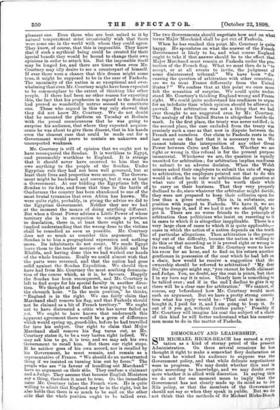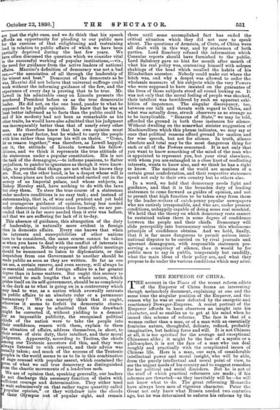DEMOCRACY AND LEADERSHIP.
SLR MICHAEL HICKS-BEACH has earned a repu- tation as a kind of stormy petrel of the present Administration. On three several occasions he has thought it right to make a somewhat fiery declaration as to what he wished his audience to suppose was the Government policy, and. that while delicate negotiations were in progress. We may doubt whether this zeal is quite according to knowledge, and we may doubt even more whether it is allied with discretion. In saying this we do not for one moment mean to imply that the Government has not clearly made up its mind as to its Nile policy, or that the members of the Government should not say so when they speak in public. But we do not think that the methods of Sir Michael Hicks-Beach are just the right ones, and we do think that his speech affords an opportunity for pleading to our public men for the exercise of that enlightening and restraining lead in relation to public affairs of which we have been partially deprived during the last few years. We have often discussed the question which we consider vital to the successful working of popular institutions,—viz., the need for guidance from the active leaders of national affairs. Mazzini's definition of democracy was not a bad one,—" the association of all through the leadership of the wisest and best." Democrat of the democrats as he was, Mazzini did not believe that universal suffrage could work without the informing guidance of the few, and the experience of every day is proving that to be true. Mr. Lowell in his admirable essay on Lincoln presents the murdered President before us as the true democratic leader. He did not, on the one hand, pander to what he supposed to be public opinion. He knew that he was at least better informed as to facts than the public could be, and if his modesty had not been as remarkable as his other traits, he would have also admitted that his judgment was incomparably better than that of nearly every other man. He therefore knew that his own opinion must count as a great factor, but he wished to carry the people with him rather than impose his will on theirs. "Come, let us reason together," was therefore, as Lowell happily put it, the attitude of Lincoln towards his fellow- citizens, and we think it represents the true attitude of the statesman under a popular constitution. His is not the task of the demagogue,—to inflame passions, to flatter prejudices, to pander to ignorance as though it were know- ledge, to pretend that things are not what he knows they are. Nor, on the other hand, is he a despot whose will is law, whose plans are both conceived and carried out in the secrecy of an Imperial palace, and whose subjects, as Bishop Horsley said, have nothing to do with the laws but obey them. To steer the true course of a statesman under modern conditions is no easy task ; and instead of statesmanship, that is, of wise and prudent and yet bold and courageous guidance of opinion, being less needed under democratic institutions than formerly, we are per- saaded that it is far more needed than it ever was before, and that we are suffering for lack of it to-day.
This absence of guidance, this abnegation of the duty of leadership, is naturally more evident in foreign than in domestic affairs. Every one knows that when the interests and susceptibilities of other nations have to be considered, the same course cannot be taken as when you have to deal with the conflict of interests in your own sphere. Nobody supposes that public meetings should be summoned to listen to diplomatists, or that despatches from one Government to another should be made public as soon as they are written. So far as one can see, a certain reserve and even secrecy, will always be an essential condition of foreign affairs to a far greater degree than in home matters. But ought this secrecy to be carried to such lengths that a whole nation, which prides itself on its self-government, should be as completely in the dark as to what is going on in a controversy which may lead to war, as a nation which avowedly entrusts as public affairs to an absolute ruler or a permanent bureaucracy ? We can scarcely think that it ought, otherwise it seems to forfeit its democratic charac- ter. Now, it may be admitted that this drawback might be corrected if, without yielding to a demand for an impossible publicity, the recognised political chiefs of the nation were to take the people into their confidence, reason with them, explain to them the situation of affairs, address themselves, in short, to their sense of civic duty, their intellect, and their moral judgment. Apparently, according to Tacitus, the chiefs ong our Teutonic ancestors did this, and they were lways listened to with respect, and their advice was sually taken; and much of the success of the Teutonic eoples in the world seems to us to lie in this combination f sage counsel with popular assent, which contained the erra of what we call true democracy as distinguished rom the chaotic movements of a leaderless mob.
We are of opinion that, speaking generally, our leaders o not discharge this necessary function of theirs with ufficient courage and determination. They either tend O wait submissively on that rather vague quantity called popular opinion, or they withdraw into the clouds f their Olympus out of popular sight, and remain there until some accomplished fact has ended the critical situation which they did not care to speak about. The questions of Armenia, of Crete, of China were all dealt with in this way, and by statesmen of both parties. Lord Rosebery refused the information which Consular reports should have furnished to the public. Lord Salisbury gave no hint for month after month of what his real policy was, contenting himself with solemn shakings of the head which recalled the habits of his Elizabethan ancestor. Nobody could make out where the hitch was, and why a despot was allowed to order the wholesale massacre of his subjects while the very Powers who were supposed to have insisted on the guarantee of the lives of those subjects stood all round looking on. It was not only that the moral feeling of people was shocked, their intellect was bewildered by such an apparent exhi- bition of impotence. The singular discrepancy, too, between our talk and threats with regard to China, and -what was actually done, struck observers as so strange as to be inexplicable. "Reasons of State," we may be told, afforded the ground in both these instances for silence. Without dwelling on the somewhat sinister suggestion of Machiavellism which this phrase indicates, we may say at once that political reasons afford ground for caution and for wise speech, but not for silence. In truth, silence absolute and total may be the most dangerous thing for each or all of the Powers concerned. It is not only that you want to know something of the mind of the man who' is appointed to represent you, but your rival elsewhere, with whom you are entangled in a close knot of conflicting interests, wants to know also, and we think he has a right to know. The nations of the world are members of a certain great confederation, and their respective statesmen speak not only to their own country but to others also.
In a word, we hold that democracy needs light and guidance, and that it is the bounden duty of leading statesmen to come forward as guides of opinion, and not to permit that high function to be taken away from them by the leader-writers of catch-penny popular newspapers who are entirely irresponsible, and who are, under present conditions, unhappily capable of doing some real mischief. Wehold that the theory on which democracy rests cannot be sustained unless there is some degree of confidence between the people and their chiefs. Democracy will slide perceptibly into bureaucracy unless this wholesome principle of confidence obtains. And we hold, finally, that it is far more dangerous to permit serious inter- national disputes to be carried on by rival journals and ignorant demagogues, with responsible statesmen pre- serving a conspiracy of silence, than it would be for public men to say in public, temperately but candidly, what the main ideas of their policy are, and what they propose to do under the various conditions which may arise.











































 Previous page
Previous page